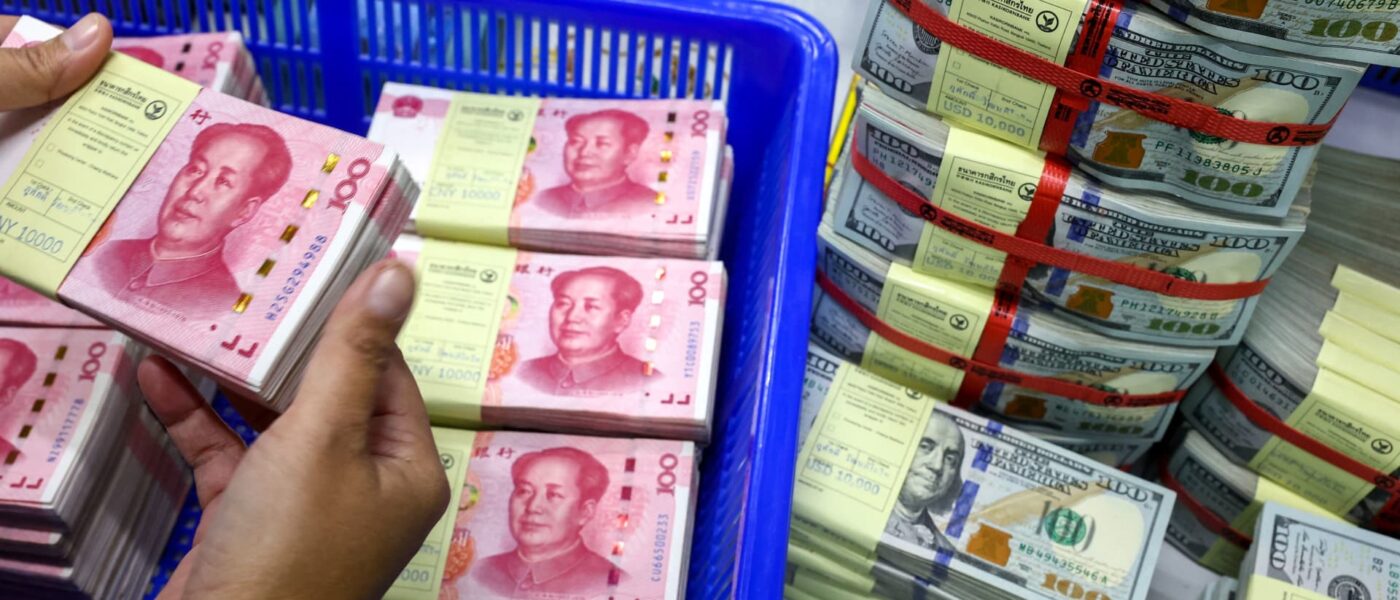China doubles down on promoting yuan as confidence in U.S. dollar ebbs
A bank employee count China’s renminbi (RMB) or yuan notes next to U.S. dollar notes at a Kasikornbank in Bangkok, Thailand, January 26, 2023.
Athit Perawongmetha | Reuters
China is devising more ways for foreign institutions to use the yuan, as international confidence in the U.S. dollar falters.
The moves aim at challenging the greenback, experts said, even as the U.S. dollar remains by far the world’s predominant currency. The timing is favorable as the U.S. dollar index has tumbled more than 9% this year — while the offshore yuan has strengthened more than 2% against the dollar.
In a sign of growing resolve in Beijing to lure the world away from the dollar, People’s Bank of China Governor Pan Gongsheng in a speech last week at the high-profile Lujiazui Forum discussed “how to weaken excessive reliance on a single sovereign currency.”
He also announced plans to set up a center for digital yuan internationalization in Shanghai and promote trading of yuan foreign exchange futures. Beijing has already rolled out a digital version of its currency to replace some cash and coins in circulation.
Much of Beijing’s recent moves focus on the futures market.
Three major Chinese exchanges announced that starting last week, qualified foreign institutional investors would be able to trade 16 more futures and options contracts listed in mainland China.
The commodities covered include natural rubber, lead and tin, according to releases on the Shanghai, Dalian and Zhengzhou exchanges.
That follows the addition of dozens of other tradable futures contracts for foreign institutional investors earlier this year, according to Zhou Ji, macro foreign exchange innovation analyst of Nanhua Futures, a Hangzhou-based brokerage focused on futures products and research.
Zhou pointed out that besides expanding the range of hedging products for international institutions, those contracts increase the influence of the yuan in the global commodity pricing system.
In another step toward encouraging global investors to use the yuan, the Shanghai Futures Exchange announced in late May it was gathering feedback for a proposal to allow foreign currencies to be used as collateral for trades settled in yuan.
Other recent moves, though incremental, include China allowing qualified foreign investors to participate in on-exchange exchange-traded fund options trading from Oct. 9 for hedging purposes. Earlier this year, authorities also reportedly announced a 500-yuan fee waiver for international financial institutions to open a local account for accessing the bond market.
Morgan Stanley in January announced its local subsidiary could officially begin offering brokerage services for mainland China commodity futures, and planned to expand to equity and fixed-income futures and options once it received necessary qualifications.
Such access has been years in the making, as the U.S. financial giant said it received China’s approval back in May 2023 to set up a wholly owned brokerage in the…






